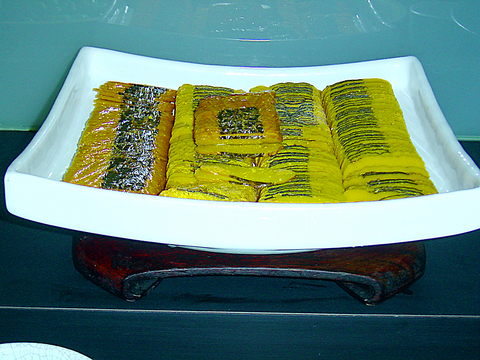Amid the bustling alleys in the hostess bar district near Linsen North Road, it's easy to walk past one of the best vegetarian spots in town because it's concealed on the third floor in a concrete, office-like building on Changchun Road. But the Spring Natural Vegetarian Restaurant is worth the journey through the urban maze, for it provides an array of vegetarian delights that taste just as good as meat, if not better, at reasonable prices.
The interior design of the restaurant makes it look like an upscale version of the organic/vegetarian eateries scattered around narrow alleys in the city. The restaurant has a comfortable and clean looking dining space with its beige table sets and charcoal gray stone floor. Even though the restaurant has eight private rooms for reservations and luxurious set meals, its main attraction is the buffet section which features a broad selection of salad, cold appetizers, soups, main courses, drinks and desserts.
The various greens on the salad plates are either organic vegetables imported from abroad, or locally grown vegetables. Serving environmentally friendly food means the eatery naturally has higher costs, but this pays off with the quality of the food. The salads are fresh, crispy and juicy. You can get a healthy feeling just by looking at it. For appetizers, you can get peculiar looking dishes such as nutrition-rich coral grass (珊瑚草) and the valuable plant tian shan hsueh lian (天山雪蓮) seasoned with honey and sweet osmanthus sauce.

PHOTO: HO YI, TAIPEI TIMES
The selection of soups and drinks should satisfy the most health-conscious customer, who can tuck into chlorophyll and wheat grass juice and Chinese herbal soups.
As for the main courses, signature dishes include kung-pao monkey head mushroom (宮保猴頭菇) and Chinese toon tree leaves Tofu (香椿豆腐). Both are ingenious creations by the chefs who blends fresh ingredients with herbal seasoning. The resulting taste is simply divine. You can also choose a vegetable and ask the chef to cook it for you on the spot.
The service is attentive and the owner Zhu Xiu-qing (朱秀卿) is often found talking to the customers about the food. Zhu told me instead of tap water, they use purified water produced by US-patented purifiers to clean all the food and cook the noodles and rice.
Business at Spring Natural is good even on the weekdays, so it is recommended to make a reservations beforehand. Otherwise, you'll have to wait outside for a long time to get a seat.

Towering high above Taiwan’s capital city at 508 meters, Taipei 101 dominates the skyline. The earthquake-proof skyscraper of steel and glass has captured the imagination of professional rock climber Alex Honnold for more than a decade. Tomorrow morning, he will climb it in his signature free solo style — without ropes or protective equipment. And Netflix will broadcast it — live. The event’s announcement has drawn both excitement and trepidation, as well as some concerns over the ethical implications of attempting such a high-risk endeavor on live broadcast. Many have questioned Honnold’s desire to continues his free-solo climbs now that he’s a

The 2018 nine-in-one local elections were a wild ride that no one saw coming. Entering that year, the Chinese Nationalist Party (KMT) was demoralized and in disarray — and fearing an existential crisis. By the end of the year, the party was riding high and swept most of the country in a landslide, including toppling the Democratic Progressive Party (DPP) in their Kaohsiung stronghold. Could something like that happen again on the DPP side in this year’s nine-in-one elections? The short answer is not exactly; the conditions were very specific. However, it does illustrate how swiftly every assumption early in an

Francis William White, an Englishman who late in the 1860s served as Commissioner of the Imperial Customs Service in Tainan, published the tale of a jaunt he took one winter in 1868: A visit to the interior of south Formosa (1870). White’s journey took him into the mountains, where he mused on the difficult terrain and the ease with which his little group could be ambushed in the crags and dense vegetation. At one point he stays at the house of a local near a stream on the border of indigenous territory: “Their matchlocks, which were kept in excellent order,

Jan. 19 to Jan. 25 In 1933, an all-star team of musicians and lyricists began shaping a new sound. The person who brought them together was Chen Chun-yu (陳君玉), head of Columbia Records’ arts department. Tasked with creating Taiwanese “pop music,” they released hit after hit that year, with Chen contributing lyrics to several of the songs himself. Many figures from that group, including composer Teng Yu-hsien (鄧雨賢), vocalist Chun-chun (純純, Sun-sun in Taiwanese) and lyricist Lee Lin-chiu (李臨秋) remain well-known today, particularly for the famous classic Longing for the Spring Breeze (望春風). Chen, however, is not a name